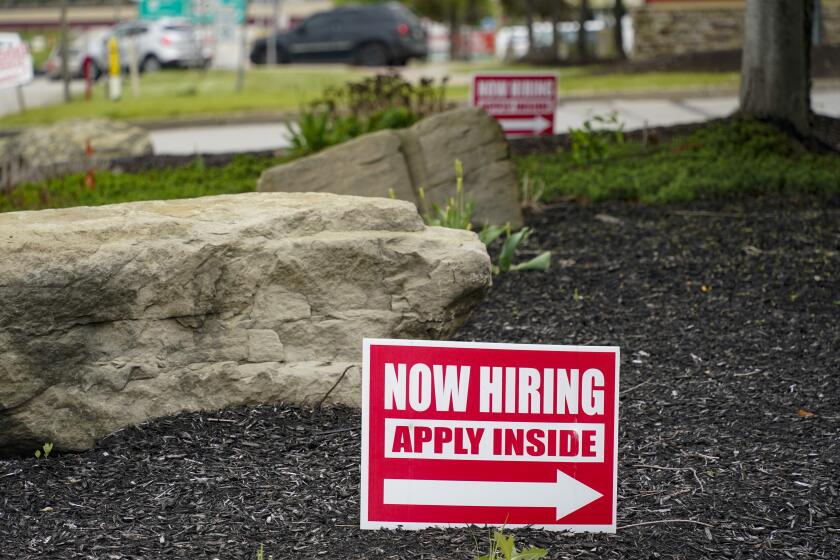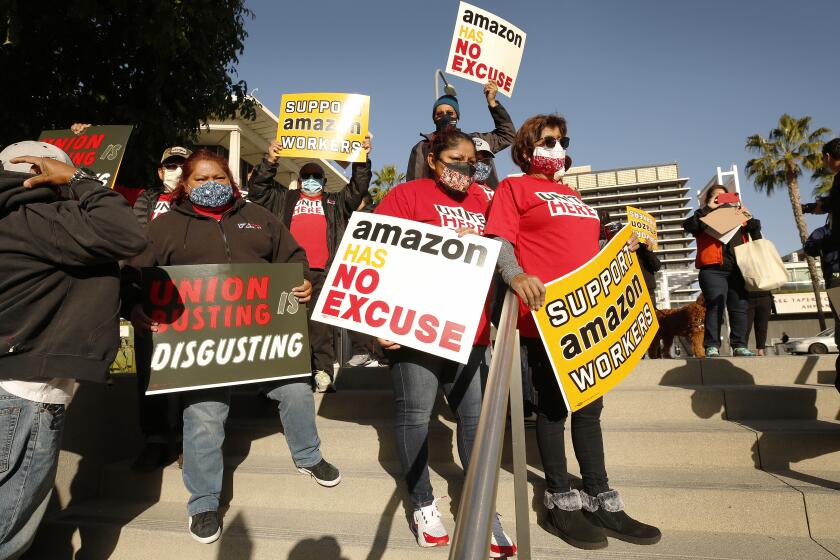
- Share via
After a successful summer internship at a mortgage tech company, Alana Klopstein was thrilled to get a job offer.
She signed the contract in January 2022, giving her peace of mind during her final year at UC San Diego. Then in June, three months before her start date, she got an email from the company. The market downturn had forced the firm to make difficult decisions, it read. Her offer was being rescinded.
“It was really devastating,” said Klopstein, 22, who lives in San Diego. “I had a vision of what my life would look like, what kind of adjustments I would have to make to transition into the working world after doing so many years of school, and that just wasn’t a thing anymore.”

As tech companies and other firms lay off workers by the thousands, some are also revoking job offers — sometimes just days before the start date and long after would-be employees relocated or restructured their lives. Rescinding of offers is not as widespread as layoffs, but the practice could grow if the economy heads into a recession.
“If the economy is where people think it’s going to be and we’re in the middle of a meaningful recession, I would expect you’ll see an impact to graduating college students and business school graduates,” said Dan Kaplan, senior client partner at Korn Ferry, a management consulting firm.
Companies typically rescind offers when “a shock hits the system,” such as the 2000 dot-com implosion, the market jitters after 9/11 or the 2008 recession, he said. More recently, companies rescinded offers at the beginning of the pandemic when there was widespread uncertainty about the future.
Today, months-long fears of a recession, combined with upheavals in industries such as crypto, financial services and tech, resulted in this latest round of rescinded offers affecting mostly entry-level and mid-career positions.
“You saw all of this surge of opportunity, surge of activity, there was this expectation we were going to see all this growth,” Jamie Kohn, research director in consulting firm Gartner’s HR practice, said of companies’ hiring practices as the pandemic eased.
You got the job. Then the company rescinds the offer. What do you do next?
“With the market being slow to pick back up, companies are not seeing that growth on the horizon. They’re starting to think maybe it’s going to be a couple more years before they get to the place that they thought they would be by now,” Kohn said.
Zening Zhao, 24, had interned at tech companies but started hearing rumors of layoffs or hiring freezes as he got closer to graduation. Working in finance seemed more stable, so he accepted a job as a Python software developer at a trading company in Chicago.
After graduating in December from the University of Washington, Zhao packed up his life in Seattle, relocated and signed a lease for a new apartment. Five days before his start date, he got a call from his employer telling him his offer was rescinded because of reductions in company expenses.
“I felt desperate at that moment,” Zhao said. “I’ve prepared everything for the job. It’s the darkest day of my life so far.”
Although the trading company paid $10,000 of Zhao’s relocation costs, the high rent in Chicago forced him to leave the city, move back to Seattle and stay with a friend. He’s now facing a tough job market flooded with out-of-work engineers — after submitting more than 100 job applications, he got only a few responses.
Cover letters are notoriously hard to write. These job seekers decided to outsource the task to ChatGPT, an AI chatbot, with impressive results.
The experience has made him more wary of the finality of job offers. And that level of skepticism could bode ill for companies later on, said Kohn of Gartner. Job candidates are now saying they don’t trust companies to be honest with them during the hiring process, she said, and they’re more likely to entertain other job offers after they’ve already accepted.
“Things like layoffs and rescinded offers just amplify the way that trust is broken,” Kohn said.
Spurning candidates with little regard for future relationships could also affect companies’ recruiting. Good talent talks to other good talent, and such actions can give firms a black eye. Assisting would-be hires in landing new gigs, on the other hand, is a goodwill gesture that can leave candidates with a positive impression.
After interviewing with two companies, Evan Patterson got job offers that were then rescinded in the same week. But the founders of both start-ups said they would pass on his resume and share his content with their networks in hopes of helping him find another gig. Those connections are now helping him in his current job search.
“They were just being decent human beings in response, and that was more than I could ask for,” said Patterson, 28, who lives in Chicago and does community and business-to-business influencer marketing for software startups. “I even told them in two, three, four years, things might change, tap me on the shoulder.”
Google and Microsoft think chatbots that can converse like humans are the future of web search. But the human workers who make sure they don’t screw up are treated as disposable.
Meta paid Noor Abdellatif six weeks’ worth of salary when the social media giant rescinded her job offer last spring for a remote recruiter position. Although she was crushed that the job didn’t work out, the payment gave her a higher opinion of the company.
“They knew people were depending their lives on that and it just, my respect honestly grew more ... toward Meta for doing this,” said Abdellatif, 32, from Severn, Md. “That was something unheard of.”
By September, she got a new job as a recruiter for an engineering firm. The annual salary is $20,000 less than she would have made at Meta, but her new employer has never laid off workers during economic downturns in its 30-year history, she said.
“That was my main goal — stability over a high pay,” Abdellatif said.
The number of rescinded offers today is “nowhere near the levels we’ve seen before,” said Kaplan of Korn Ferry, because companies typically have other options to tap before they withdraw offers, such as reducing bonuses or layoffs.
“You spend so much time and energy to bring people into your company, the worst thing you can do is to go back to them and take it back,” he said. “Companies really try to avoid them.”
Wildly profitable tech companies are citing an as-yet notional recession to make deep workforce cuts. They may have another agenda.
But when they happen, it’s crucial to reach out to your networks, whether that’s LinkedIn, an alumni association or an industry-specific group.
Isa Goldberg got hundreds of supportive comments and messages from connections on LinkedIn after she posted about her experience of having a healthcare consultant job offer rescinded just six days before her start date.
“I was just flabbergasted,” Goldberg, 27, who lives in Brooklyn, said of the rescinding. “I just took kind of an hour to cry, have an emotional moment, come to the ground and realize what was going on.”
The company offered to pay her $5,000 or let her stay in the job applicant pool until January, when it would potentially have a job open. She tried to negotiate for a higher payment but was unsuccessful.
Goldberg ended up breaking her lease in New York City, moving in with family to save money and looking for a new opportunity. She found one in three weeks, thanks to a referral from a college friend.
“It’s definitely a shock when you think you’re on the diving board of your career, and you jump off and you end up with a shallower bottom than you hoped,” Goldberg said.
But, she said, “the benefit of having a strong, supportive network outweighs the momentary upset that getting a rescinded offer causes. Let people help you immediately.”

Klopstein, from San Diego, is still looking for a job in software engineering. It’s been a grueling last few months, with interviews that went nowhere, radio silence after submitting applications and emails saying companies are no longer hiring.
She’s considering getting a part-time job outside of tech just to tide herself over until she can find something. But she’s trying to stay optimistic.
“It’s definitely a difficult market,” Klopstein said. “Luckily I’ve had some friends find stuff, and it gives me hope that there’s something waiting for me in the near future.”
More to Read
Inside the business of entertainment
The Wide Shot brings you news, analysis and insights on everything from streaming wars to production — and what it all means for the future.
You may occasionally receive promotional content from the Los Angeles Times.















